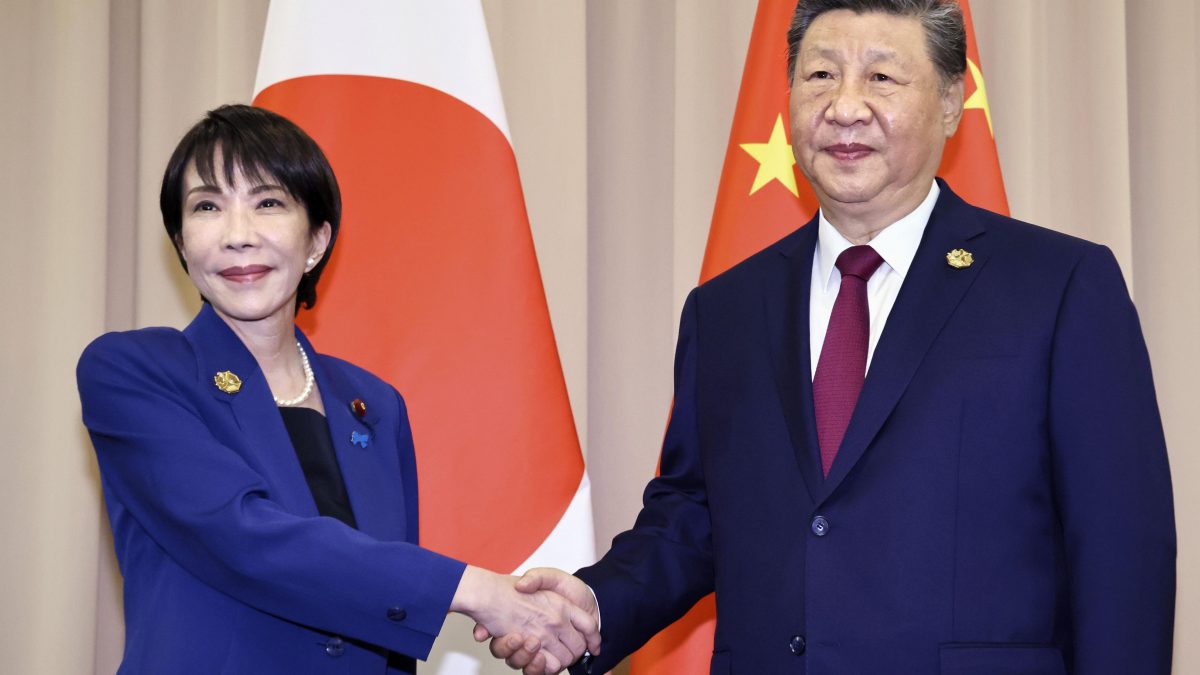Amid rising tensions with Beijing following Prime Minister Sanae Takaichi’s recent comments on Taiwan, Japan said on Monday it had scrambled fighter jets after detecting a suspected Chinese drone near its southernmost island.
“On Saturday, 15 November 2025, an unmanned aerial vehicle, believed to be of Chinese origin, was confirmed to have flown between Yonaguni Island and Taiwan. In response, fighter aircraft from the Japan Air Self-Defense Force’s Southwest Air Defense Command scrambled,” the defence ministry said on X.
The incident has prompted Beijing to advise its citizens to avoid travelling to Japan. The fallout follows Takaichi’s warning to lawmakers earlier this month that a Chinese attack on Taiwan threatening Japan’s survival could trigger a military response — a scenario previous governments refrained from discussing publicly to avoid provoking Beijing, which claims the self-ruled island.
Possible Takaichi–Li Qiang meeting at G20
Takaichi may have an opportunity to speak directly with China’s Premier Li Qiang later this week, with both expected to attend the Group of 20 summit in South Africa from Friday.
In New Taipei on Monday, Taiwan President Lai Ching-te told reporters that China was mounting a “multifaceted attack” on Japan.
“I call on the international community to continue paying close attention, and I also urge China to exercise restraint and act in a manner befitting a major power, rather than becoming a troublemaker for regional peace and stability,” he said.
Diplomatic row escalates after Osaka consul’s remarks
The dispute intensified following Takaichi’s 7 November comment, made just a week after she met Chinese leader Xi Jinping and agreed to pursue stable ties. The next day, China’s Consul General in Osaka, Xue Jian, wrote in a now-deleted post on X that “the dirty neck that sticks itself in must be cut off.” Japan summoned China’s ambassador over what it described as an “extremely inappropriate” remark, while several Japanese lawmakers called for Xue’s expulsion.
China issues protest, warns Japan
The rift widened on Thursday when China summoned Japan’s ambassador for the first time in more than two years to lodge a “strong protest” over Takaichi’s comments.
On Friday, China warned that Japan would face a “crushing” military defeat if it intervened over Taiwan and expressed “serious concerns” about Japan’s security trajectory, including ambiguity over its three non-nuclear principles — not to develop, possess or host nuclear weapons.
Quick Reads
View AllA Reuters investigation in August found increasing political and public willingness in Japan to reconsider that longstanding pledge, long regarded as taboo in the only nation to have suffered an atomic bombing.
Coast guard confrontation near disputed islands
On Sunday, a formation of Chinese coast guard vessels sailed through waters around a group of East China Sea islands administered by Japan but claimed by China. Known as the Senkaku in Japan and the Diaoyu in China, the islands have been a flashpoint since Japan nationalised them in 2012. Japan’s coast guard said it had driven the Chinese ships away.
US envoy joins criticism; Chinese media attacks Takaichi
US Ambassador to Japan George Glass also intervened, posting several messages on X criticising Xue’s remarks. In his latest comment on Saturday, he said it was time to move on, adding that “Halloween has been and gone” after the Chinese diplomat referred to Takaichi as “an evil witch”.
Chinese state-linked media continued attacking Takaichi on Monday. “Takaichi’s dangerous remarks, which have touched the nerves of all parties, were not only strategic recklessness, but also deliberate provocation,” the Communist Party’s People’s Daily said in an editorial.
Economic risks rise as Chinese tourist numbers may fall
If the row continues, a decline in Chinese visitors similar to the roughly 25 per cent fall seen during the 2012 island dispute could deliver a significant economic hit, said Takahide Kiuchi, executive economist at Nomura Research Institute.
“A fall in visitor numbers of that scale would have a dampening effect exceeding half of Japan’s annual growth,” he said.
In anticipation of that potential impact, tourism-sensitive shares slipped in Tokyo, with department store operator Isetan Mitsukoshi down more than 10 per cent in early trade and Japan Airlines falling by more than 4.4 per cent.
)